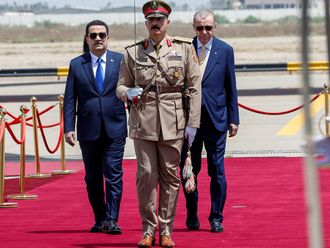Beirut: Iran hasn't been shy about efforts to monitor, filter and block content on the internet. Now it has taken the next leap, turning online censorship into an institution.
This past week, the government said it has formed a high council dedicated to cleansing the country's internet of sites that threaten morality and national security, launching what amounts to a centralised command structure for online censorship.
The Supreme Council of Cyberspace, created by decree last week by Supreme Leader Ayatollah Ali Khamenei, includes heads of intelligence, militia, security and the powerful Iranian Revolutionary Guard Corps, as well as media chiefs. Charged with supervising all cyberactivity, it will have the power to enact laws, according to state media.
The body will have its own budget and offices, a member of the council said in an interview with state media on Wednesday.
Initiatives
In announcing the council, Iran unites internet-control initiatives that have previously been floated in state media. Along with other moves in the past week, it shows that the Islamic Republic, after long viewing the internet as a minor nuisance, has fully embraced the view that Iran's vibrant online activity is a destabilising threat.
The Revolutionary Guards, or IRGC, said last week it has rolled out a secure internal network for high-level commanders, underscoring Tehran's concerns about outside threats to its government's online activities. Iran also announced in the past week that its "Cyber Army," as it styles its legion of government hackers and bloggers, has reached 120,000, a number impossible to corroborate but well above previous tallies.
In an annual report released on Monday, the group Reporters Without Borders ranked Iran the number one enemy of the internet in 2012. It was ahead of 11 other countries — including Saudi Arabia, Bahrain, Syria, China and Belarus — that the group says restrict internet access, filter content and imprison bloggers.
The Iranian council's mandate became clearer on Wednesday when one of its members, conservative cleric Hamid Shahriari, said the council was the result of a year and a half of weekly meetings between security chiefs and Khamenei representatives. "We are worried about a portion of cyberspace that is used for exchanging information and conducting espionage," he said in an interview with the semiofficial Mehr news agency.
"We have identified and confronted 650 websites that have been set up to battle our regime — 39 of them are by opposition groups and our enemies, and the rest promote Western culture and worshiping Satan, and stoke sectarian divides," he said.
He didn't name the sites or whether they had already been filtered. Shahriari said the council would also "focus and facilitate positive aspects of the internet, like business and trade."
The IRGC's new network — named Basir, or "Perceptive" — is a domestically built, secure telecommunication channel that will allow its highest-level officers to communicate and command brigades in the case of an attack, the guard's newspaper, Sobhe Sadegh, reported last week.
‘Must prepare'
"We are not in an imaginary state of threats and sanctions," Hussain Salami, the deputy commander in chief of the IRGC, said during the network's inauguration ceremony last week, according to Iranian media reports. "We must prepare."
Israel has in recent weeks drummed up support for a possible attack on what it alleges are sites linked to nuclear-weapon production, a pursuit Iran denies. Iran is also worried about cyberattacks on its nuclear facilities, such as the 2010 Stuxnet virus that appeared aimed at disabling Iranian centrifuge arrays.
The IRGC's closed network appears to be separate from a national internet that Iran's telecommunications company has said it expects to complete within a year, which leaders have billed as void of Western culture and un-Islamic content.











